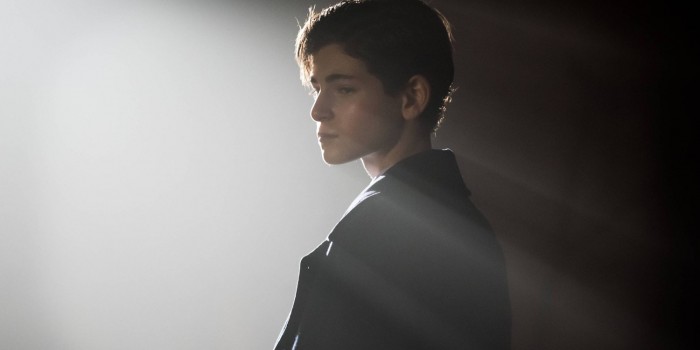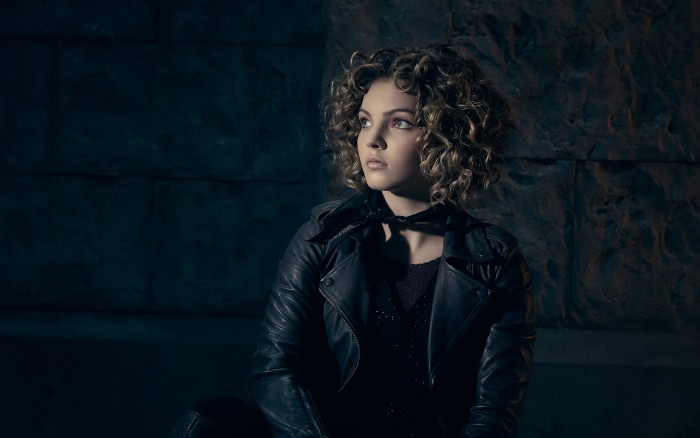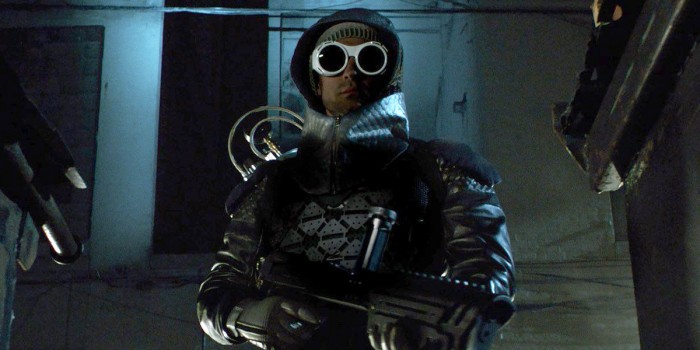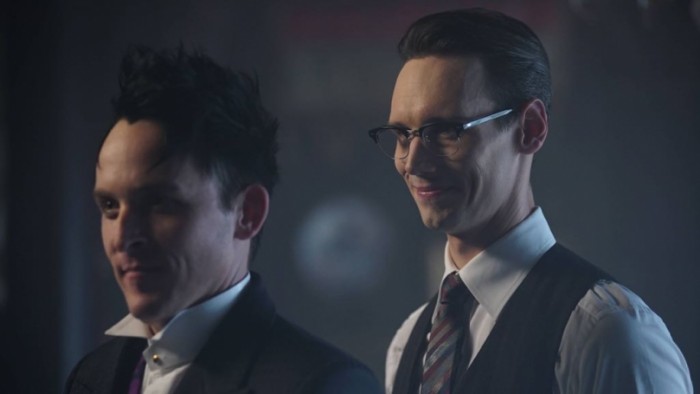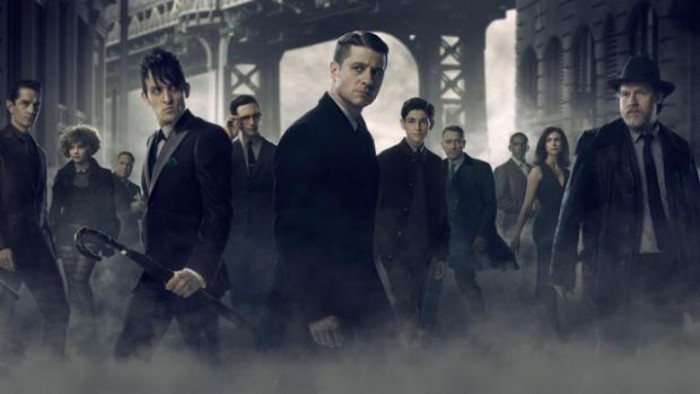Growing Up 'Gotham': The Bizarre, Frustrating Inconsistencies Of Fox's Batman Prequel
As Gotham returns for the rest of its third season, it's still full of mixed blessings. Since the pilot, the good has gotten better and the bad has gotten worse, making it a bit of a hard sell to anybody who isn't a Batman nut already. And even then, the liberties that the show takes might be enough to turn the biggest Bat-fans off. This becomes more of a pity as the good gets really good; as such, the question is whether or not it's good enough redeem the parts of the show that are as baffling as any puzzle posed by the Riddler. Let's see where we stand as we head into the back half of season three, "Heroes Rise."
Gordon Growing Pains
When the show began, it was marketed as the story of how Jim Gordon (Ben McKenzie) went from a Gotham City detective to the police commissioner that we all know now. Broadly speaking, it's a solid pitch; Gordon's youth isn't something we usually get too much insight into, mostly because he's not the main character of the franchise where he's a regular ally and supporting plater. However, Gotham doesn't quite manage to make a case for giving him his own platform, which is a problem that manifests on two levels.
The first reason is that Gordon's storyline remains its weakest part. His character changes from week-to-week depending on what's necessary to further the plot. He's morally strict one week and willing to bend the rules the next. He's wracked by guilt over his more violent actions and then he's a ruthless killing machine. This inconsistency means that the characters whose storylines depend on him are made inconsistent, too. The most egregious examples are his love interests: Barbara Kean (Erin Richards, consistently terrific) only becomes a discernible character after a season and a half because her storyline depends so heavily on Gordon until then. The same goes for Lee Thompkins (Morena Baccarin), who has yet to be truly defined outside of her relationship with Gordon. Then there's Valerie Vale (Jamie Chung), who barely survives a handful of episodes and a brief flirtation. Everyone is short-changed by a hero who can't quite seem to decide who he is. Harvey Bullock (Donal Logue) is the only exception to the rule, but that's because he's given more to work with than making doe eyes.
The second reason is that, unlike some of the more minor characters, there's an indelible footprint that Gordon needs to follow. Like the tether between Better Call Saul and Breaking Bad, it's a matter of filling in from Point A to Point B, except we've gone so far off course that it's hard to see how the two versions of Gordon we have will be able to reconcile.
Batman Begins
That Gordon is such an incomplete leading man only makes it stranger that Bruce Wayne (David Mazouz) takes second fiddle. Mazouz is easily Gotham's most valuable asset; his performance is incredibly self-possessed and mature, and as the show has progressed, it has only become more remarkable, on par with the best Waynes (Batmen?) that have come before him. It helps that his storyline is his own. Again, we have to get from Point A to Point B, but the path from Bruce Wayne to Batman is one that he largely has to draw on his own. Gordon plays a bigger part in his life in this iteration of the Batman origin story than he does in any other version, but by this point in the show, Gordon isn't so much of an immediate influence in Bruce's life. His appearances are limited to what they would be if he were any other cop in the city.
He's aided by Sean Pertwee as a rougher (but no less tender) take on Alfred, as the butler is just as ready to go a round of fisticuffs as anyone else on the show. The series wisely doesn't try to swap in Gordon as Bruce's father figure, and the rapport that Pertwee and Mazouz have built over the course of three seasons is palpable in the scenes that they share. There's something of a shock built in as this Alfred diverges from the more prim and proper butler we're used to, but it makes sense within the structure of a show that requires Bruce to be developing an alter ego already, as opposed to coming to it once he reaches adulthood.
Nine Lives
Some of Mazouz's best work has been opposite Camren Bicondova as the young Selina Kyle. Her performance is similarly assured, and the early seed of the relationship between Batman and Catwoman is particularly compelling as it grows out of adolescent doubt and anxiety rather than the larger melodrama that characterizes the rest of the series. It's grounded in the human rather than the supernatural, which is when the show as a whole is its best.
Look at the the first half of season three, which saw a plot in which Selina and Bruce stole an item from the Court of Owls. What made it compelling wasn't the way that it tied into the larger Batman mythos, but how it (briefly) brought Selina's mother (Ilana Milicevic) into the picture. Aspects that focus on the human rather than the supernatural are consistently the most interesting parts of the show.
Growing Up Gotham
Predicating an entire show on the younger versions of well-known characters is a risky gambit. It can feel like exploiting pre-existing goodwill, and it sometimes it is exactly that. It works when those characters are given the space to breathe (Bruce and Selina are given that space by necessity, as we know roughly where they end up), but space isn't Gotham's forte. The show goes through its brand-name villains like Kleenex, which is an especially egregious sin given the terrific roster of guest stars it's brought on (James Frain, Nathan Darrow, BD Wong, Tommy Flanagan, to name a few). Throwing recognizable baddies like Mr. Freeze and Clayface into the mix seems to be the show's way of scrambling to keep Bat-fans watching. Origin stories get twisted or simply discarded in ways that don't always make sense, especially when it comes to the fact that it's Gordon who's battling them all. Who is Batman going to be facing down by the time he comes of age?
The rate of turnover also makes it difficult to make any emotional investment. Because Gotham is a prequel, we know that there's only so much that can happen given Gordon's guaranteed survival. When each villain seems to last only two to three episodes, why should we bother worrying about anyone involved?
Breaking Bad
Speaking of villains, the last big dynamic on the show is that between Edward Nygma (Cory Michael Smith) and Oswald Cobblepot (Robin Lord Taylor). Both do superlative work with material that could easily fold in on itself under the weight of bad dialogue and unnecessary melodrama. Unfortunately, it's a balance that's precarious, as Nygma's descent into supervillainy still feels like it's only happening because he eventually has to be a supervillain rather than for any organic reason. That said, the plot between the two of them is the biggest diversion from canon and one that's largely been carried off on the strength of their performances. The biggest through-line in the third season thus far has been Cobblepot's gradual falling for Nygma, and it's been the rare instance of Gotham striking out into new territory that's had compelling results.
Gotta Have a Gimmick
All that aside, there's one problem that's plagued Gotham that's much bigger than all the rest: from the very start, Gotham has had trouble committing to a tone. The animated series and the Burton movies were gloriously camp, accentuating the fantastical in a premise that is admittedly strange, and producing a sense of pathos out of unapologetic fun. (To wit, Batman: The Animated Series is often cited as one of the best animated series of all time, and images and lines from Batman and Batman Returns have entered into iconic popular culture.) The recent Nolan movies went in the other direction, putting every egg into realism's basket and ushering in the age of "dark and gritty" superhero movies after an era of technicolor. Even The Dark Knight Rises, the least well-received entry in the trilogy, had undeniably striking beats, especially given the themes of inequity that seemed tailored to the current sociopolitical climate.
Gotham falls into an unfortunate middle. It veers camp, even recruiting Paul Reubens to semi-reprise his role from Tim Burton's films as the Cobblepot patriarch, but its desire to be taken seriously means that it counterbalances its wilder instincts with violence and angst that doesn't quite mesh. Take, for example, the introduction of Mr. Freeze (Nathan Darrow). One of his test subjects melts in what is easily one of the most gruesome sequences in the show, and it's in direct juxtaposition with the broad acting of the catty pharmacy clerk he deals with just moments afterward. They might as well be on different shows. The pity here is that Gotham has proven it can do both elements well, just not in concert with each other. Three seasons in, it still hasn't really found a balance; let's hope that changes.

